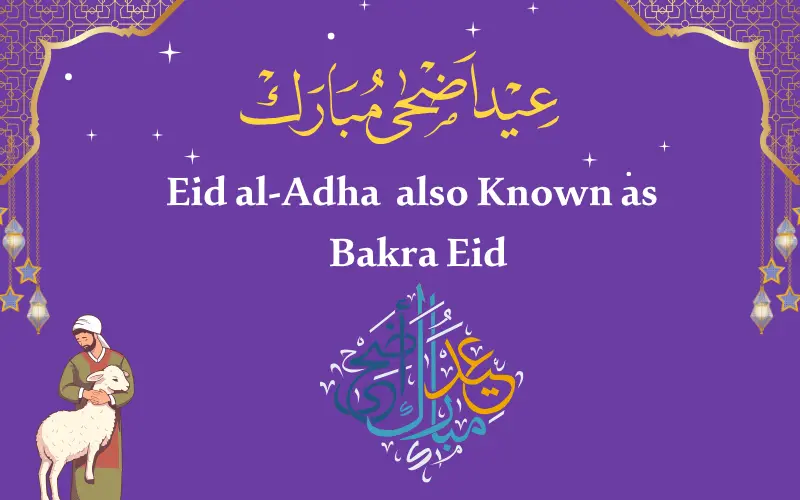Eid al-Adha is commonly referred to as Bakra Eid in South Asian countries like India, Pakistan, and Bangladesh due to the tradition of sacrificing a goat, called bakra in Hindi and Urdu, as part of the religious observance. While “Eid al-Adha” is the Arabic term meaning “Festival of Sacrifice,” the name “Bakra Eid” highlights the local cultural emphasis on the goat, which is the most commonly sacrificed animal in the region.
This practice commemorates the willingness of Prophet Ibrahim (Abraham) to sacrifice his son in obedience to God’s command, and the subsequent divine substitution of a ram. Over time, the term “Bakra Eid” became popular in South Asia as a more relatable, descriptive name that reflects the visible aspect of the celebration: the ritual Qurbani (sacrifice) of goats. Despite the different names, both terms refer to the same Islamic festival and carry the same deep spiritual significance.
Unveiling the Meaning, History, and Significance Behind the Popular Name
When Islamic festivals are celebrated around the world, you may often come across the term “Bakra Eid,” especially in South Asian countries like India, Pakistan, and Bangladesh. But globally, the festival is more formally known as Eid al-Adha. So why is Eid al-Adha called Bakra Eid? What’s the history behind the name, and how does it reflect the traditions of this holy occasion?
In this blog, we’ll take a deep dive into:
- The origin and meaning of Eid al-Adha
- Why is it popularly referred to as Bakra Eid
- Cultural and linguistic influences behind the term
- The religious significance and symbolic meaning
- Regional differences in naming and celebration
- FAQs about Bakra Eid vs. Eid al-Adha
What is Eid al-Adha?
Eid al-Adha, also known as the Festival of Sacrifice, is one of the two major Islamic holidays celebrated by Muslims around the world. It falls on the 10th day of Dhu al-Hijjah, the last month of the Islamic lunar calendar, and marks the culmination of the Hajj pilgrimage to Mecca.
The festival commemorates the unwavering faith of Prophet Ibrahim (Abraham), who was willing to sacrifice his beloved son, Ismail, as an act of obedience to God’s command. However, before the sacrifice could be completed, God intervened and provided a ram to be sacrificed instead.
Thus, Eid al-Adha honors this act of devotion and obedience, symbolized through the ritual of animal sacrifice.
Why is Eid al-Adha Called Bakra Eid?
The term “Bakra Eid” is commonly used in South Asia, especially in:
- India
- Pakistan
- Bangladesh
- Nepal
Let’s break it down:
- “Bakra” is a Hindi-Urdu word that means “goat”
- “Eid” is the Arabic word for “festival” or “celebration.”
So, “Bakra Eid” literally translates to “Goat Festival.”
This name reflects the local tradition of sacrificing goats during Eid al-Adha. While the Arabic name emphasizes the spiritual and historical background (i.e., the sacrifice made by Prophet Ibrahim), the South Asian term highlights the most visible cultural practice: the sacrifice of a goat or similar animal.
The Role of Animal Sacrifice in Eid al-Adha
The act of Qurbani (sacrifice) is central to the observance of Eid al-Adha. Muslims who can afford it are required to sacrifice a halal animal, typically:
- A goat
- A sheep
- A cow
- Or a camel
In South Asia, goats are the most commonly sacrificed animals due to their availability, affordability, and ease of handling in urban and rural settings. This strong association between the festival and goat sacrifice led to the colloquial use of the term “Bakra Eid.”
Regional Naming Differences: A Global Perspective
Region Common Name Meaning
Middle East Eid al-Adha Festival of Sacrifice
South Asia (India, Pakistan, Bangladesh) Bakra Eid Goat Festival
Turkey Kurban Bayramı Sacrifice Festival
Indonesia / Malaysia Hari Raya Haji or Idul Adha Pilgrimage Festival
Africa Eid al-Kabir The Greater Eid
The diversity in naming reflects how language, culture, and local practices shape the way this Islamic holiday is perceived and celebrated around the world.
The Spiritual Message Behind the Name
While the name Bakra Eid highlights the visible act of goat sacrifice, the deeper spiritual message of Eid al-Adha lies in its profound emphasis on faith, obedience, and selflessness. The festival commemorates Prophet Ibrahim’s unwavering willingness to sacrifice his son in submission to God’s command, symbolizing the ultimate test of devotion.
The act of Qurbani (sacrifice) is not merely about the slaughter of an animal, but a reflection of a believer’s readiness to give up what they love for the sake of Allah. It teaches the values of gratitude, sharing, and compassion, as the meat from the sacrifice is distributed among family, friends, and the poor. In essence, Eid al-Adha calls Muslims to reflect on their relationship with God and with fellow human beings, reminding them that true piety lies in sincerity, humility, and acts of kindness.
While “Bakra Eid” captures the cultural practice, Eid al-Adha represents the spiritual essence of:
- Faith
- Sacrifice
- Charity
- Community
Muslims are encouraged to distribute the meat from the sacrificed animal into three parts:
- One-third for their own family
- One-third for relatives and friends
- One-third for the poor and needy
This act symbolizes sharing, compassion, and equality, the core tenets of Islam.
Final Thoughts
While Eid al-Adha is its formal and religious name, the title “Bakra Eid” emerged from cultural and linguistic adaptations in South Asia. The name reflects the regional preference for goat sacrifice and serves as a meaningful expression of local customs intertwined with global Islamic traditions.
Whether you call it Eid al-Adha or Bakra Eid, the heart of the celebration remains the same: faith, sacrifice, and generosity.
Bonus Fact – Did You Know?
“Bakrid” is another popular variant of the term Bakra Eid, commonly used in South India. It also derives from the same roots.
Frequently Asked Questions (FAQs)
Is Bakra Eid the same as Eid al-Adha?
Yes. Bakra Eid is a colloquial name used in South Asia for Eid al-Adha, referring to the practice of sacrificing goats.
Why is a goat sacrificed during Eid?
The goat (or other livestock) is sacrificed to honor Prophet Ibrahim’s willingness to sacrifice his son in obedience to God. It symbolizes devotion and submission to Allah.
Can other animals be sacrificed during Eid al-Adha?
Yes. Besides goats, cows, sheep, and camels are also permissible as per Islamic guidelines. The choice often depends on affordability, region, and availability.
Do all Muslims call it Bakra Eid?
No. The term “Bakra Eid” is regional. Most of the Muslim world uses the term Eid al-Adha, which is the Arabic name of the festival.






